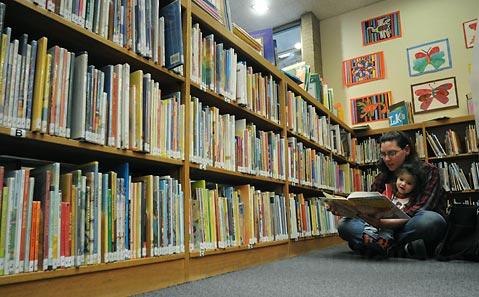Goleta Library Struggles to Offer Full Services
Children’s Librarian Position Faces a Cut to Balance Budget

Libraries, like print journalism, are said to be dying relics of paper-based industries; they dwindle but refuse to go away. Goleta’s library is a much loved and well-used example of resilience, with service numbers that rival those of Santa Barbara’s Central Library, and for a city that’s about a third the size. A funding crisis, however, might change that equation, despite the library’s added computers, WiFi, education programs, meeting room rentals, and school visits to its book circulation services.
The red ink is so bad that when the children’s librarian left to take another job, Goleta decided to save the approximately $100,000 salary-and-benefits cost by leaving the position empty. Goleta Valley Library, like all libraries in the Santa Barbara Public Library System, ran at a deficit this fiscal year, and has for several years due to state funding cuts and the inability of revenue to keep up with expense increases. Fundraising by “Friends” and cities of the individual libraries have been making up the difference; the City of Santa Barbara paid about $5 million out of its General Fund toward the two libraries within its borders this year.
Goleta has been making up the shortfall with a reserve fund, but the number-crunchers say that will be exhausted soon. Citing passionately how important books were to him as a kid and the importance of reading at a young age, Goleta City Councilmember Tony Vallejo pleaded with his cohorts at their June 7 meeting to find a way to bring back the children’s librarian. Library System director Jennifer Cadiente bolstered Vallejo’s plea, stating in an interview that the children’s librarian works closely with the community devising education and programs that fit their needs.
Goleta’s Council voted to give the library $60,000 out of the Developer Impact Fee fund — which is limited to book-buying — and the county supervisors just gave an additional $200,000 to help the 15-member Library System. According to Cadiente, Goleta’s share will be $41,328. But even that fails to close the gap.
For several years, the Ad Hoc Library Committee, consisting of Councilmembers Paula Perotte and Michael Bennett, has been meeting with the county’s Library Advisory Committee to find a way to fund all the libraries fully, without having to go to cities to fill in the gaps. Raising a tax for the libraries was the main topic of conversation, according to Bennett, but Goleta was recently told to look out for itself. The countywide tax plan was not gelling quickly enough to help Goleta’s shortfall, which was accumulating despite the city’s maintenance of the facility without charge.
About a third of Goleta Valley Library’s funds come from County Service Area (CSA) 3, and a plan being worked out to raise the tax for CSA 3 fell apart at the Goleta Council’s June 7 meeting. The CSA was established in 1990 by Measure L to fund the Goleta Valley Library with a parcel tax assessed according to land use category on 16,455 properties.
With Goleta’s incorporation as a city in 2002, the CSA now sits atop city and county parcels. It was only during planning for the ballot measure that staff realized a 2009 state decision meant the county could only charge a uniform tax on all parcels. The city could still charge the Measure L tiered fees, which range from $22 for a single-family dwelling to $133 for apartments, but mixing the two rate structures in a single ballot measure, city and county staffs thought, would only be a reason to vote against the measure.
Moreover, a poll taken in 2014 to judge voter sentiment found that $18 was the sweet spot at which voters would tax themselves. And a high of 55 percent of those surveyed went for that sum. On June 7, city staff pointed out that an $18 tax, and even the alternative $24 amount, would not enable the library to be fully funded; with its children’s librarian and a needed library technician added, the library budget tops out at about $1.5 million for 2016-2017. Bennett pointed out the other sticking point: In a vote on taxation, a supermajority of two-thirds had to prevail.
The pre-recession library was open 63 hours a week. It currently turns on the lights 55 hours a week. And the Friends of the Goleta Valley Library — which raises money through its library lobby book sale, $10 membership fee, and the occasional cash donation — intends to pitch in $70,000-$80,000 to keep the doors open on Sundays and fund children’s programs, said Corinne Horowitz, the group’s president. When all the math settles out, the Goleta library finds itself about $25,000 short and with no children’s librarian. The City Council takes the issue up again on July 19.
Editor’s Note: This story was amended on July 6, 2016, to correct the name of the library, which is Goleta Valley Library.



